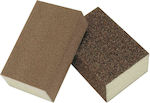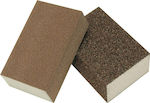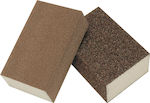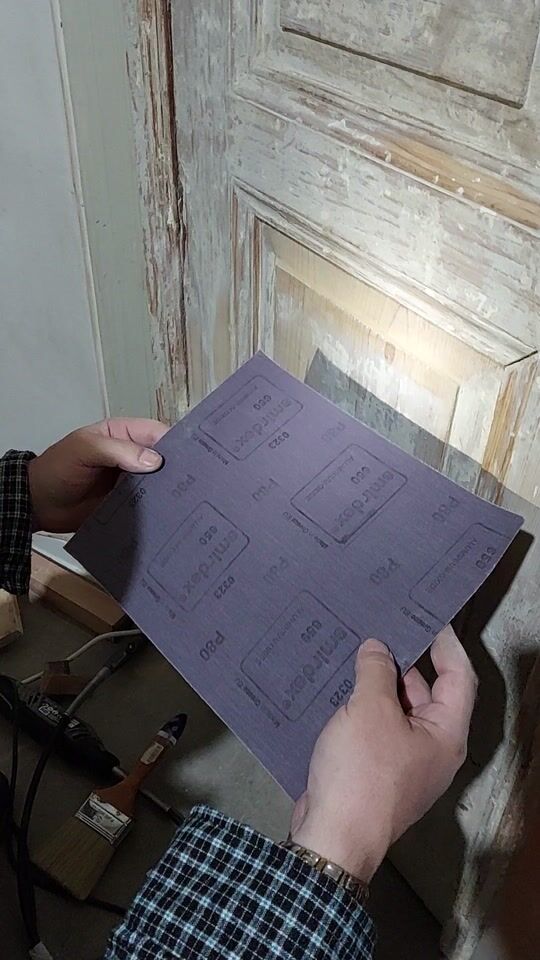Smirdex 650 J-Flex Cloth Simple Sanding Sheet K320 230x280mm
Similar products

 Top rated
Top ratedSand Papers
Smirdex 270 Simple Sanding Sheet K1500 230x280mm Set 50pcs Waterproof
Ad from ErgaleiaraAdded Top rated
Top rated
 Top rated
Top rated






All shops
Prices are calculated for:Luxembourg, Other Payment Options
650 J-Flex Cloth Simple Sanding Sheet K320 230x280mm 650010320
Store products- 0,60 €
- 0,80 €
650 J-Flex Cloth Simple Sanding Sheet K320 230x280mm 650010320
Store products650 J-Flex Cloth Simple Sanding Sheet K320 230x280mm 650010320
Store products650 J-Flex Cloth Simple Sanding Sheet K320 230x280mm 650010320
Store products650 J-Flex Cloth Simple Sanding Sheet K320 230x280mm 650010320
Store products
Description
The J-Cloth 650 series made of flexible cotton fabric type J is suitable for sanding metals and hard wood.
The flexible cotton structure of the cloth provides excellent durability for sanding difficult surfaces and adaptability to curved surfaces.
The closed grain structure of the Aluminum Oxide acts catalytically for the excellent friction performance of metal surfaces and hard wooden surfaces.
Application:
- wood
- metal
Manufacturer
Specifications
- Product Number
- 650010320
Specifications
- Type
- Regular Sanding Sheet
- with Holes
- No
- Granulation
- K320
- Pieces
- 1 pcs
- Number of Holes
- -
Dimensions
- Length
- 280 mm
- Width
- 230 mm
Important information
Specifications are collected from official manufacturer websites. Please verify the specifications before proceeding with your final purchase. If you notice any problem you can report it here.
Reviews
Very good. If I remember correctly, it is for both wood and metal. It works well on wood. It removes perhaps a little more material compared to other Smirdex sandpapers. It does not clog easily. It is durable and bends very well because it does not have paper on the back but something like fabric that makes it bend and not wear out quickly when working in tight spaces, as with other sandpapers made of paper.
My son is in the video. If it gets torn more, it will tear more easily, especially when it is in its original size.
Smirdex produces at least 3 series of sandpapers. The Burgundy, the Orange, and the Silver. The Burgundy series is for both Wood and Metal. It is the most aggressive of the three compared to the others at the same grit. That is, the 80 grit Burgundy is more aggressive than the Orange and even more than the Silver at 80 grit. It removes more metal or wood.
The Orange is for wood. It is less aggressive than the Burgundy and more than the Silver always compared at the same grit, at the same coarseness.
The Silver is a finishing sandpaper, Finish, for when finishing wood processing and wanting to give it a good touch. It is very wood-friendly.
Depending on the condition of the wood and what each person wants, they will make a choice. You use the Silver if you want to gradually progress in wood processing without removing a lot of wood.
If you want to remove old paint to reach the wood, the Silver will take you a long time. There you choose either the Burgundy or the Orange in small Grit 40 - 60 - 80.
The Burgundy is more expensive but has a longer lifespan because its grains are resistant to friction. The Orange wears out faster and the Silver even faster.
When making an aggressive sandpaper, you ensure that the grains are hard to remove material, wood, paint, varnish, rust (if it is metal). Their hardness is the reason they last longer.
In mild sandpaper, the grains are soft to be wood-friendly and not to remove material quickly. Soft grains mean their rapid wear.
The Silver is good in large Grit to roughen a primer, paint to apply the next layer. That is, 180, 220 and higher numbers are good for roughening. Small numbers will remove the primer, the paint instead of roughening it.
All three series, if one reads the back, have grains made of different materials.
The hardness of the wood also plays a role in choosing sandpaper. Whether it is soft, medium or hard. In soft wood, after removing paint etc., I prefer to work with the Silver initially. In hard wood, I will start with the Orange and if necessary, I will also go to the Burgundy.
One can take a sandpaper from each series at the same Grit, take a piece of wood, draw a straight line with a pencil and sand it with each sandpaper to see how quickly it erases the line. One can also use a marker, but it will erase more slowly because the marker paint is likely to be absorbed by the wood pores.
All this on woods you do not care about. Experiment first and then work on the wood you want.
It requires observation and searching on YouTube in videos that explain how to work with sandpaper.
If I were not at an amateur level, I would upload a video. However, I am still learning the basics so I do not want to say things that may not be true.
Good efforts on woods that are readily available for experiments. Time passes pleasantly.Translated from Greek ·Did you find this review helpful?









































